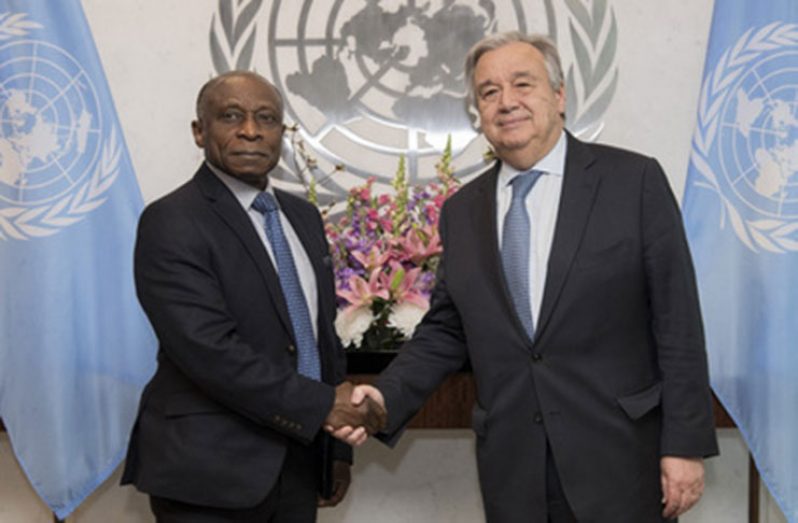– seeks protection for foreign company
GUYANA has called on the International Court of Justice (ICJ) to order Venezuela to immediately withdraw from and cease occupation of the eastern half of Ankoko Island and every other area recognised as its sovereign territory in accordance with the 1899 Arbitral Award and the 1905 Agreement.
One week after filing its application to the ICJ Vice-President and Minister of Foreign Affairs Carl Greenidge on Wednesday met with United Nations (UN) Secretary-General António Guterres at the UN headquarters in New York.
Venezuela National Army occupied the Guyana side of the Ankoko Island in the Cuyuni River which is the western border between the two states; five months after independence, in October 1966 and has remained in illegal occupation ever since. The island is used as a military garrison to harass miners and to engage in occasional acts of provocation against the Guyana Defence Force’s (GDF) border detachment at Eteringbang on the opposite bank of the river.
The eastern half of Ankoko Island situated at the confluence of the Cuyuni and Wenamu rivers, which forms part of the boundary between Guyana and Venezuela, was taken over by the Venezuelan Army in 1966. The Venezuelans constructed a military base, an airstrip and a post office and brought in civilian settlers.
Meanwhile, in a statement issued by the ICJ on Wednesday, the court said Guyana also called on the court to have Venezuela “refrain from threatening or using force against any person and/or company licensed by Guyana or engage in economic or commercial activity in Guyanese territory as determined by the 1899 Award and 1905 Agreement, or in any maritime areas appurtenant to such territory over which Guyana has sovereignty or exercises sovereign rights, and shall not interfere with any Guyanese or Guyanese-authorised activities in those areas”.
Additionally, Guyana’s application noted that Venezuela is internationally responsible for violations of Guyana’s sovereignty and sovereign rights, and for all injuries suffered by Guyana as a consequence. The application also requests the ICJ to declare that the 1899 Award is valid and binding upon Guyana and Venezuela, and the boundary established by that Award and the 1905 Agreement is valid and binding upon Guyana and Venezuela.
“Guyana enjoys full sovereignty over the territory between the Essequibo River and the boundary established by the 1899 Award and the 1905 Agreement, and Venezuela enjoys full sovereignty over the territory west of that boundary; Guyana and Venezuela are under an obligation to fully respect each other’s sovereignty and territorial integrity in accordance with the boundary established by the 1899 Award and the 1905 Agreement,” Guyana’s application states.
“On March 29, Guyana filed an application against Venezuela with the ICJ, the principal judicial organ of the United Nations. In its application, Guyana requests the Court “to confirm the legal validity and binding effect of the Award Regarding the Boundary between the Colony of British Guiana and the United States of Venezuela, of October 3, 1899 (hereinafter the ‘1899 Award’)”.
Guyana also stated that the 1899 Award was “a full, perfect, and final settlement” of all questions relating to determining the boundary line between the colony of British Guiana and Venezuela. It is Guyana’s position that between November 1900 and June 1904, a joint Anglo-Venezuelan Boundary Commission “identified, demarcated and permanently fixed the boundary established by the Award” before the signing of a Joint Declaration by the Commissioners on January 10, 1905 (referred to by Guyana as the “1905 Agreement”).
Guyana stated that in 1962, for the first time, Venezuela contested the Award as “arbitrary” and “null and void”. This, according to Guyana, led to the signing of the Agreement to resolve the controversy between Venezuela and the United Kingdom of Great Britain and Northern Ireland over the frontier between Venezuela and British Guiana at Geneva on February 17, 1966 (the Geneva Agreement), which “provided for recourse to a series of dispute settlement mechanisms to finally resolve the controversy”.
Additionally, Guyana submits that the Geneva Agreement authorised the United Nations Secretary-General to decide which appropriate dispute resolution mechanism to adopt for the peaceful settlement of the dispute, in accordance with Article 33 of the United Nations Charter. On January 30, 2018, UN Secretary-General António Guterres determined that the Good Offices Process had failed to achieve a peaceful settlement of the controversy. Guterres took a formal and binding decision, under Article IV, paragraph 2 of the Agreement, to choose a different means of settlement under Article 33 of the Charter.
In identical letters to both Parties, the UN Secretary-General communicated the terms of his decision that, pursuant to the authority vested in him by the Geneva Agreement, the controversy shall be settled by recourse to the International Court of Justice (ICJ) Guyana’s application to the ICJ has been filed pursuant to the Secretary-General’s decision. The full text of Guyana’s application is available on the ICJ website.
The ICJ is the principal judicial organ of the United Nations. It was established by the United Nations Charter in June 1945 and began its activities in April 1946. The seat of the Court is at the Peace Palace in The Hague (Netherlands).


.jpg)











